Social Development in Child Development Process
VerifiedAdded on 2023/01/18
|7
|1032
|32
AI Summary
This document discusses the role of social development in child development process and explores various theories that explain it. It also covers milestones in self-concept, self-esteem, and self-identity, along with the factors influencing these aspects of a child's development.
Contribute Materials
Your contribution can guide someone’s learning journey. Share your
documents today.
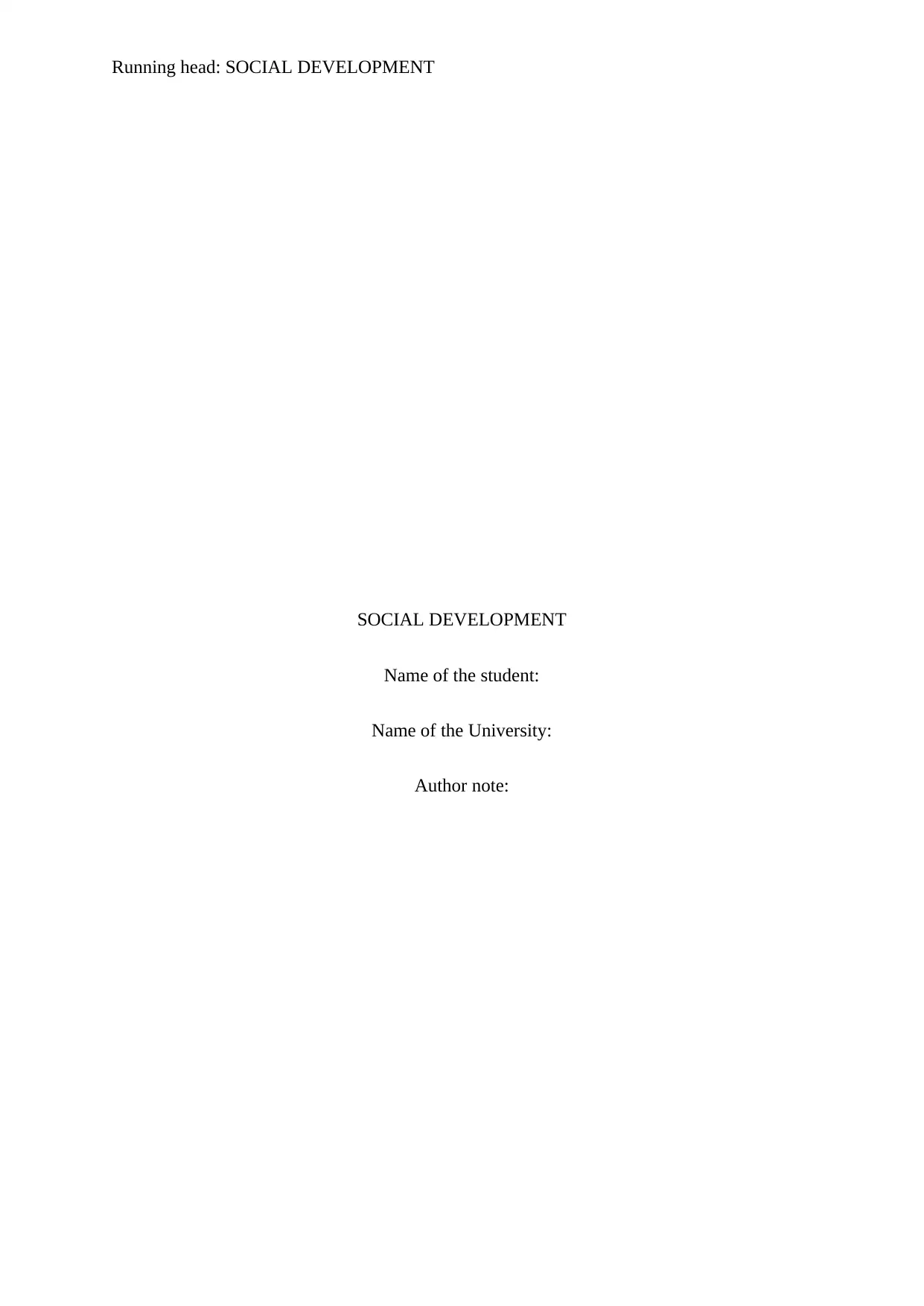
Running head: SOCIAL DEVELOPMENT
SOCIAL DEVELOPMENT
Name of the student:
Name of the University:
Author note:
SOCIAL DEVELOPMENT
Name of the student:
Name of the University:
Author note:
Secure Best Marks with AI Grader
Need help grading? Try our AI Grader for instant feedback on your assignments.
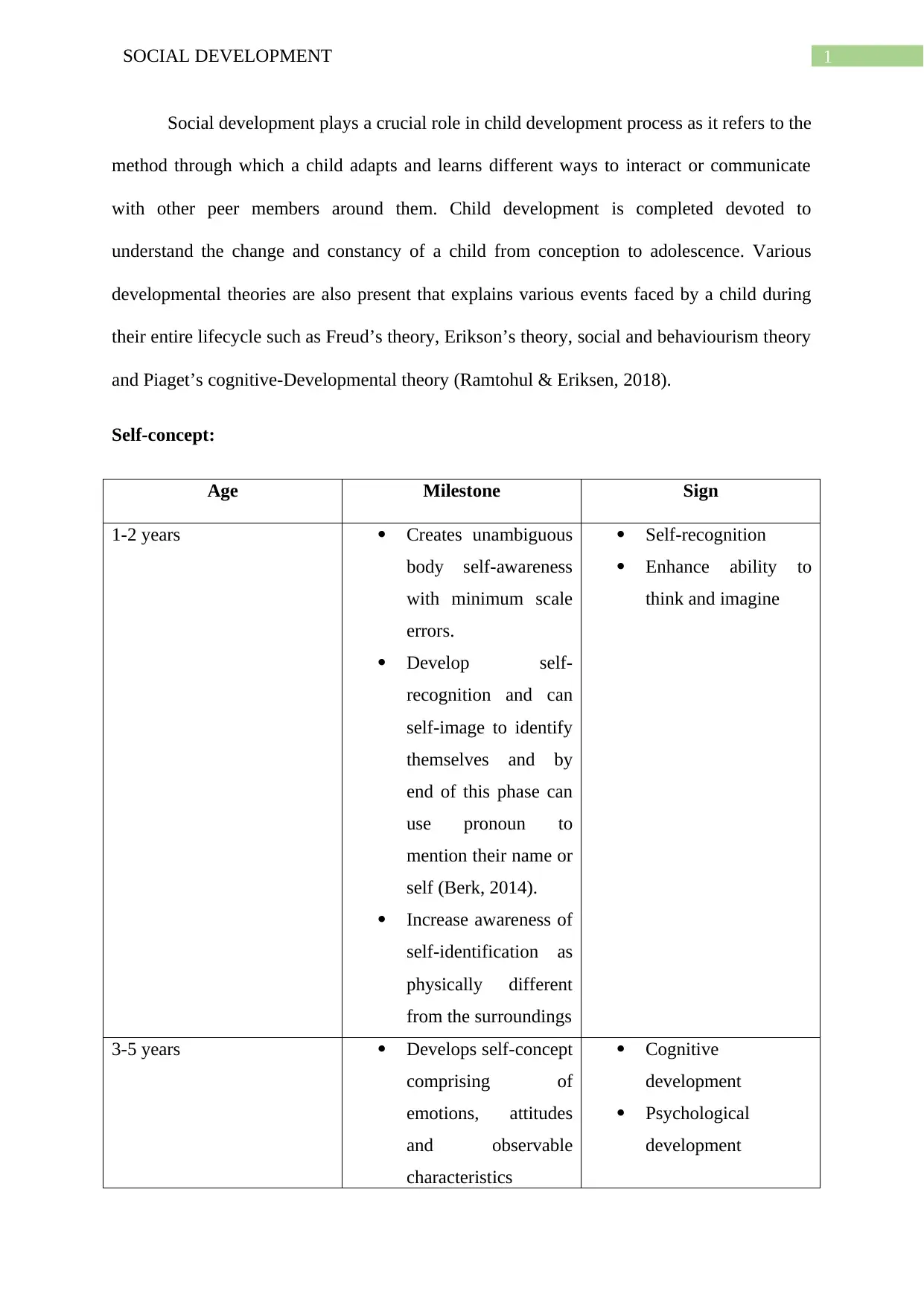
1SOCIAL DEVELOPMENT
Social development plays a crucial role in child development process as it refers to the
method through which a child adapts and learns different ways to interact or communicate
with other peer members around them. Child development is completed devoted to
understand the change and constancy of a child from conception to adolescence. Various
developmental theories are also present that explains various events faced by a child during
their entire lifecycle such as Freud’s theory, Erikson’s theory, social and behaviourism theory
and Piaget’s cognitive-Developmental theory (Ramtohul & Eriksen, 2018).
Self-concept:
Age Milestone Sign
1-2 years Creates unambiguous
body self-awareness
with minimum scale
errors.
Develop self-
recognition and can
self-image to identify
themselves and by
end of this phase can
use pronoun to
mention their name or
self (Berk, 2014).
Increase awareness of
self-identification as
physically different
from the surroundings
Self-recognition
Enhance ability to
think and imagine
3-5 years Develops self-concept
comprising of
emotions, attitudes
and observable
characteristics
Cognitive
development
Psychological
development
Social development plays a crucial role in child development process as it refers to the
method through which a child adapts and learns different ways to interact or communicate
with other peer members around them. Child development is completed devoted to
understand the change and constancy of a child from conception to adolescence. Various
developmental theories are also present that explains various events faced by a child during
their entire lifecycle such as Freud’s theory, Erikson’s theory, social and behaviourism theory
and Piaget’s cognitive-Developmental theory (Ramtohul & Eriksen, 2018).
Self-concept:
Age Milestone Sign
1-2 years Creates unambiguous
body self-awareness
with minimum scale
errors.
Develop self-
recognition and can
self-image to identify
themselves and by
end of this phase can
use pronoun to
mention their name or
self (Berk, 2014).
Increase awareness of
self-identification as
physically different
from the surroundings
Self-recognition
Enhance ability to
think and imagine
3-5 years Develops self-concept
comprising of
emotions, attitudes
and observable
characteristics
Cognitive
development
Psychological
development
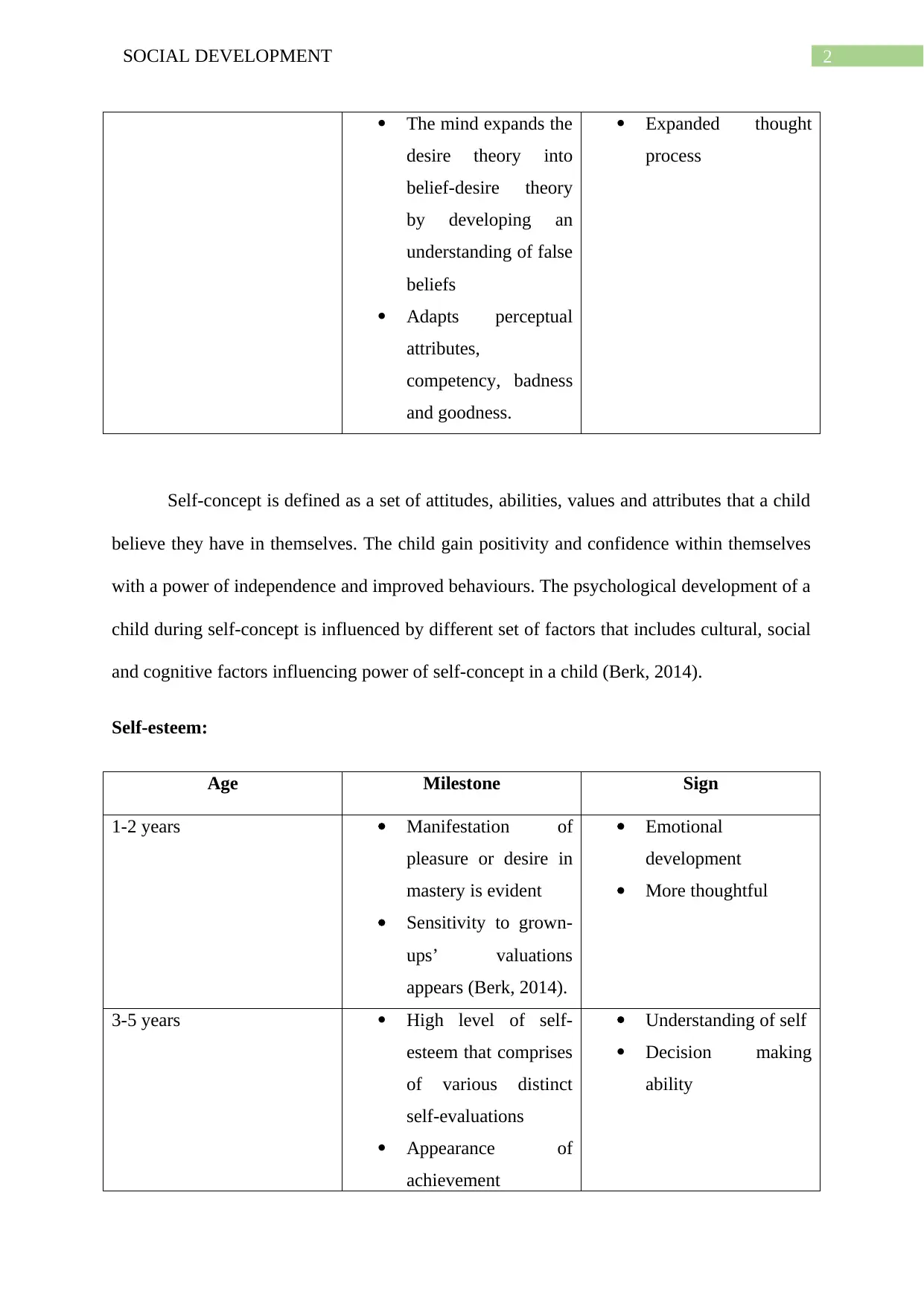
2SOCIAL DEVELOPMENT
The mind expands the
desire theory into
belief-desire theory
by developing an
understanding of false
beliefs
Adapts perceptual
attributes,
competency, badness
and goodness.
Expanded thought
process
Self-concept is defined as a set of attitudes, abilities, values and attributes that a child
believe they have in themselves. The child gain positivity and confidence within themselves
with a power of independence and improved behaviours. The psychological development of a
child during self-concept is influenced by different set of factors that includes cultural, social
and cognitive factors influencing power of self-concept in a child (Berk, 2014).
Self-esteem:
Age Milestone Sign
1-2 years Manifestation of
pleasure or desire in
mastery is evident
Sensitivity to grown-
ups’ valuations
appears (Berk, 2014).
Emotional
development
More thoughtful
3-5 years High level of self-
esteem that comprises
of various distinct
self-evaluations
Appearance of
achievement
Understanding of self
Decision making
ability
The mind expands the
desire theory into
belief-desire theory
by developing an
understanding of false
beliefs
Adapts perceptual
attributes,
competency, badness
and goodness.
Expanded thought
process
Self-concept is defined as a set of attitudes, abilities, values and attributes that a child
believe they have in themselves. The child gain positivity and confidence within themselves
with a power of independence and improved behaviours. The psychological development of a
child during self-concept is influenced by different set of factors that includes cultural, social
and cognitive factors influencing power of self-concept in a child (Berk, 2014).
Self-esteem:
Age Milestone Sign
1-2 years Manifestation of
pleasure or desire in
mastery is evident
Sensitivity to grown-
ups’ valuations
appears (Berk, 2014).
Emotional
development
More thoughtful
3-5 years High level of self-
esteem that comprises
of various distinct
self-evaluations
Appearance of
achievement
Understanding of self
Decision making
ability
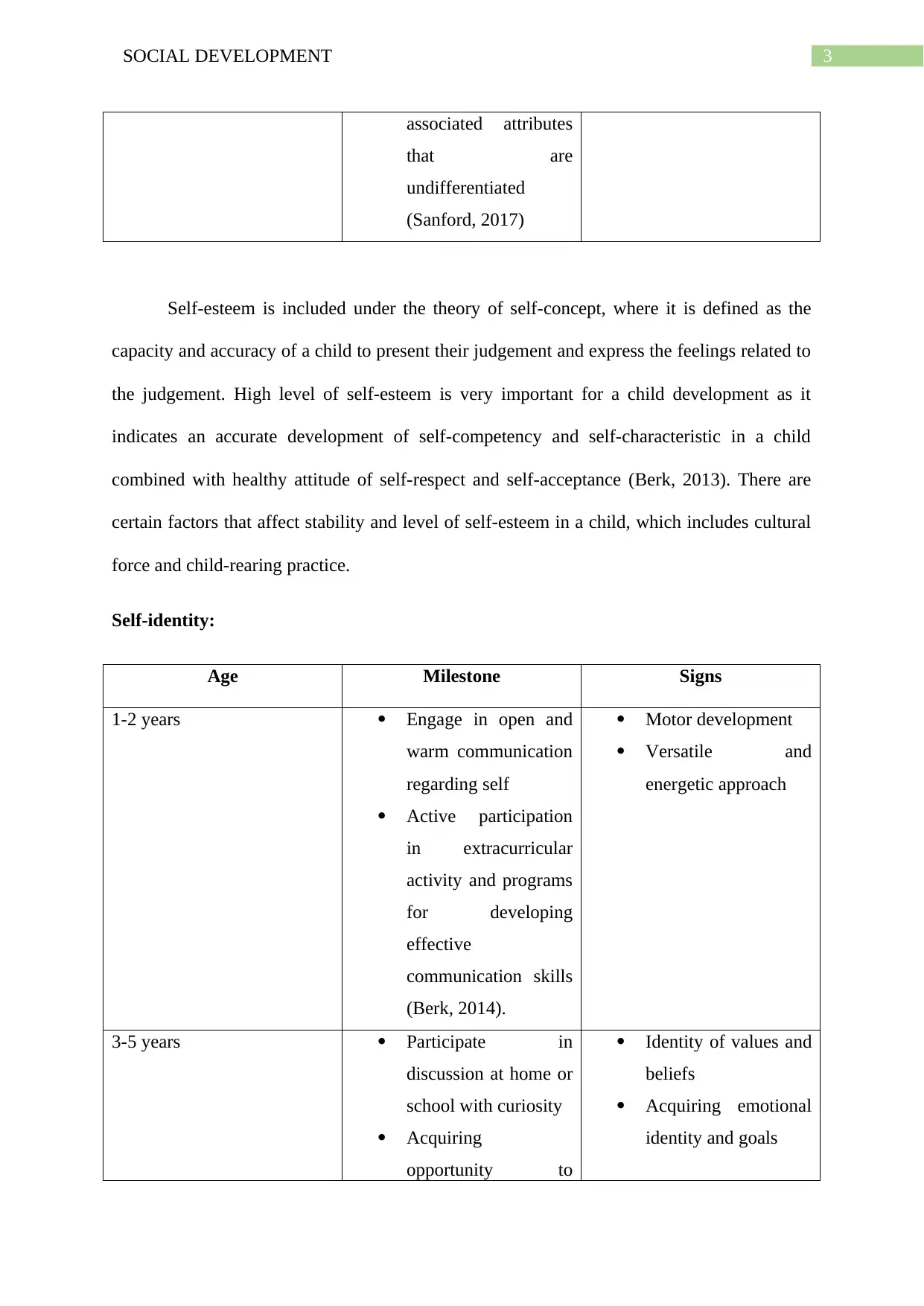
3SOCIAL DEVELOPMENT
associated attributes
that are
undifferentiated
(Sanford, 2017)
Self-esteem is included under the theory of self-concept, where it is defined as the
capacity and accuracy of a child to present their judgement and express the feelings related to
the judgement. High level of self-esteem is very important for a child development as it
indicates an accurate development of self-competency and self-characteristic in a child
combined with healthy attitude of self-respect and self-acceptance (Berk, 2013). There are
certain factors that affect stability and level of self-esteem in a child, which includes cultural
force and child-rearing practice.
Self-identity:
Age Milestone Signs
1-2 years Engage in open and
warm communication
regarding self
Active participation
in extracurricular
activity and programs
for developing
effective
communication skills
(Berk, 2014).
Motor development
Versatile and
energetic approach
3-5 years Participate in
discussion at home or
school with curiosity
Acquiring
opportunity to
Identity of values and
beliefs
Acquiring emotional
identity and goals
associated attributes
that are
undifferentiated
(Sanford, 2017)
Self-esteem is included under the theory of self-concept, where it is defined as the
capacity and accuracy of a child to present their judgement and express the feelings related to
the judgement. High level of self-esteem is very important for a child development as it
indicates an accurate development of self-competency and self-characteristic in a child
combined with healthy attitude of self-respect and self-acceptance (Berk, 2013). There are
certain factors that affect stability and level of self-esteem in a child, which includes cultural
force and child-rearing practice.
Self-identity:
Age Milestone Signs
1-2 years Engage in open and
warm communication
regarding self
Active participation
in extracurricular
activity and programs
for developing
effective
communication skills
(Berk, 2014).
Motor development
Versatile and
energetic approach
3-5 years Participate in
discussion at home or
school with curiosity
Acquiring
opportunity to
Identity of values and
beliefs
Acquiring emotional
identity and goals
Secure Best Marks with AI Grader
Need help grading? Try our AI Grader for instant feedback on your assignments.
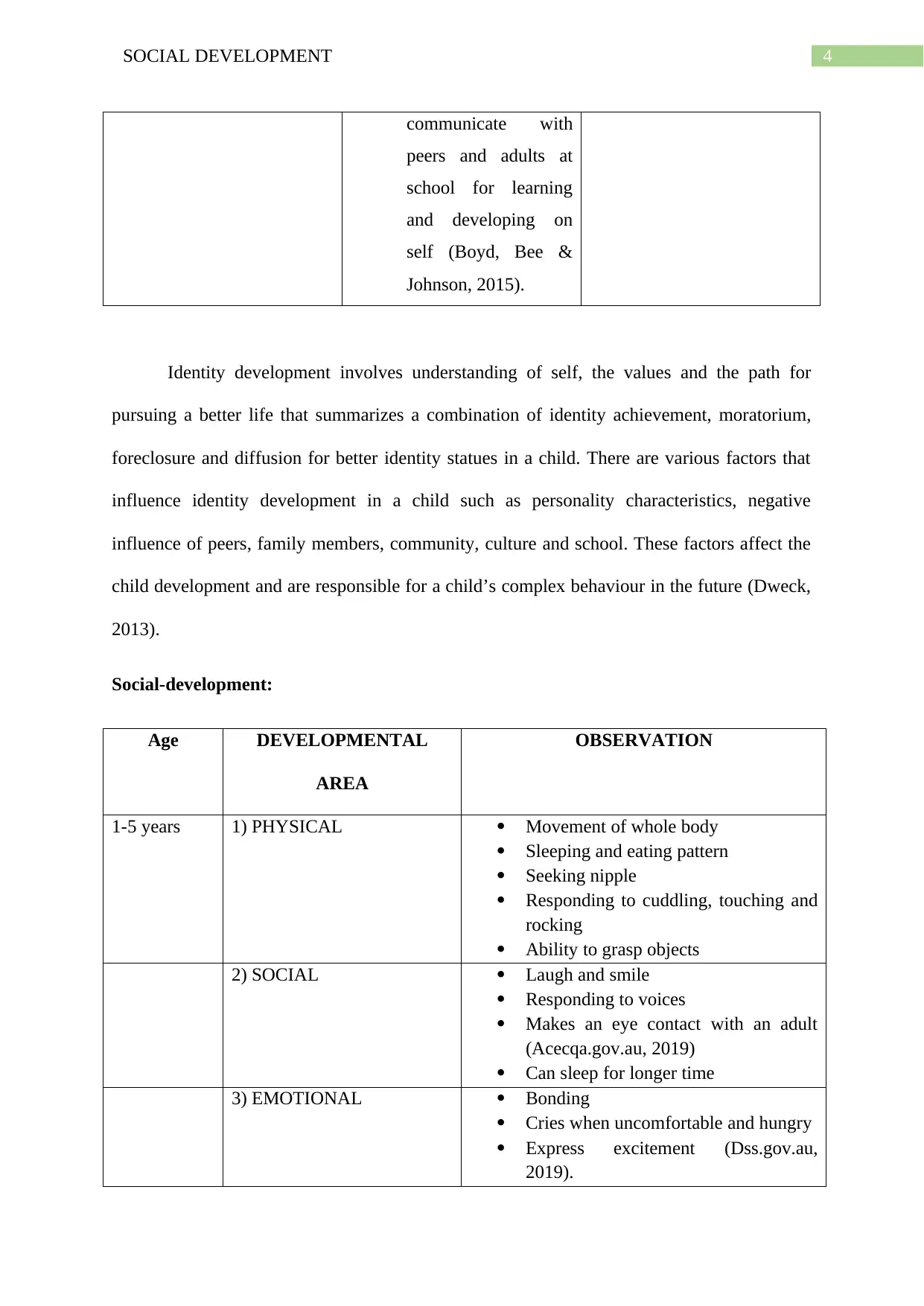
4SOCIAL DEVELOPMENT
communicate with
peers and adults at
school for learning
and developing on
self (Boyd, Bee &
Johnson, 2015).
Identity development involves understanding of self, the values and the path for
pursuing a better life that summarizes a combination of identity achievement, moratorium,
foreclosure and diffusion for better identity statues in a child. There are various factors that
influence identity development in a child such as personality characteristics, negative
influence of peers, family members, community, culture and school. These factors affect the
child development and are responsible for a child’s complex behaviour in the future (Dweck,
2013).
Social-development:
Age DEVELOPMENTAL
AREA
OBSERVATION
1-5 years 1) PHYSICAL Movement of whole body
Sleeping and eating pattern
Seeking nipple
Responding to cuddling, touching and
rocking
Ability to grasp objects
2) SOCIAL Laugh and smile
Responding to voices
Makes an eye contact with an adult
(Acecqa.gov.au, 2019)
Can sleep for longer time
3) EMOTIONAL Bonding
Cries when uncomfortable and hungry
Express excitement (Dss.gov.au,
2019).
communicate with
peers and adults at
school for learning
and developing on
self (Boyd, Bee &
Johnson, 2015).
Identity development involves understanding of self, the values and the path for
pursuing a better life that summarizes a combination of identity achievement, moratorium,
foreclosure and diffusion for better identity statues in a child. There are various factors that
influence identity development in a child such as personality characteristics, negative
influence of peers, family members, community, culture and school. These factors affect the
child development and are responsible for a child’s complex behaviour in the future (Dweck,
2013).
Social-development:
Age DEVELOPMENTAL
AREA
OBSERVATION
1-5 years 1) PHYSICAL Movement of whole body
Sleeping and eating pattern
Seeking nipple
Responding to cuddling, touching and
rocking
Ability to grasp objects
2) SOCIAL Laugh and smile
Responding to voices
Makes an eye contact with an adult
(Acecqa.gov.au, 2019)
Can sleep for longer time
3) EMOTIONAL Bonding
Cries when uncomfortable and hungry
Express excitement (Dss.gov.au,
2019).
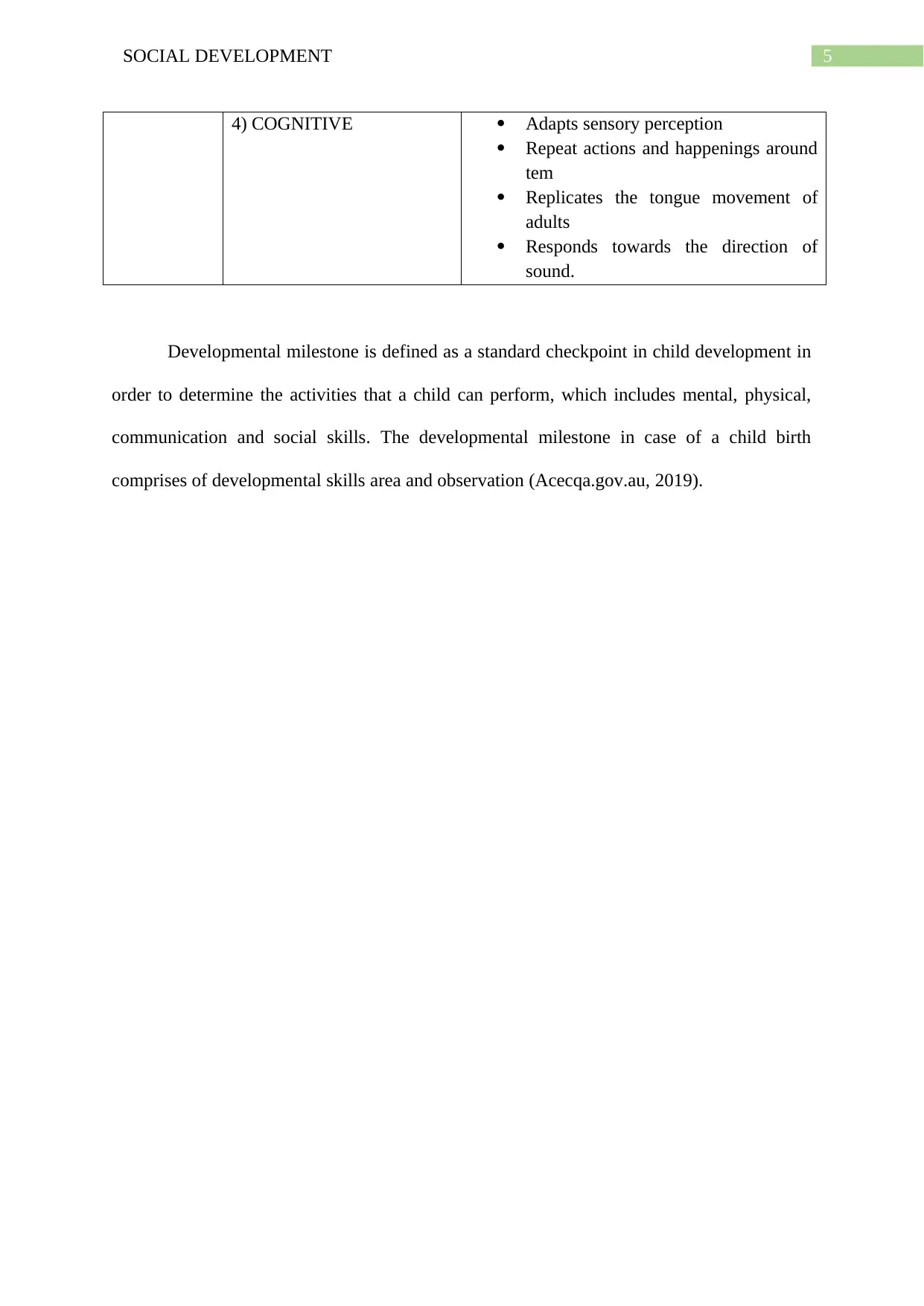
5SOCIAL DEVELOPMENT
4) COGNITIVE Adapts sensory perception
Repeat actions and happenings around
tem
Replicates the tongue movement of
adults
Responds towards the direction of
sound.
Developmental milestone is defined as a standard checkpoint in child development in
order to determine the activities that a child can perform, which includes mental, physical,
communication and social skills. The developmental milestone in case of a child birth
comprises of developmental skills area and observation (Acecqa.gov.au, 2019).
4) COGNITIVE Adapts sensory perception
Repeat actions and happenings around
tem
Replicates the tongue movement of
adults
Responds towards the direction of
sound.
Developmental milestone is defined as a standard checkpoint in child development in
order to determine the activities that a child can perform, which includes mental, physical,
communication and social skills. The developmental milestone in case of a child birth
comprises of developmental skills area and observation (Acecqa.gov.au, 2019).
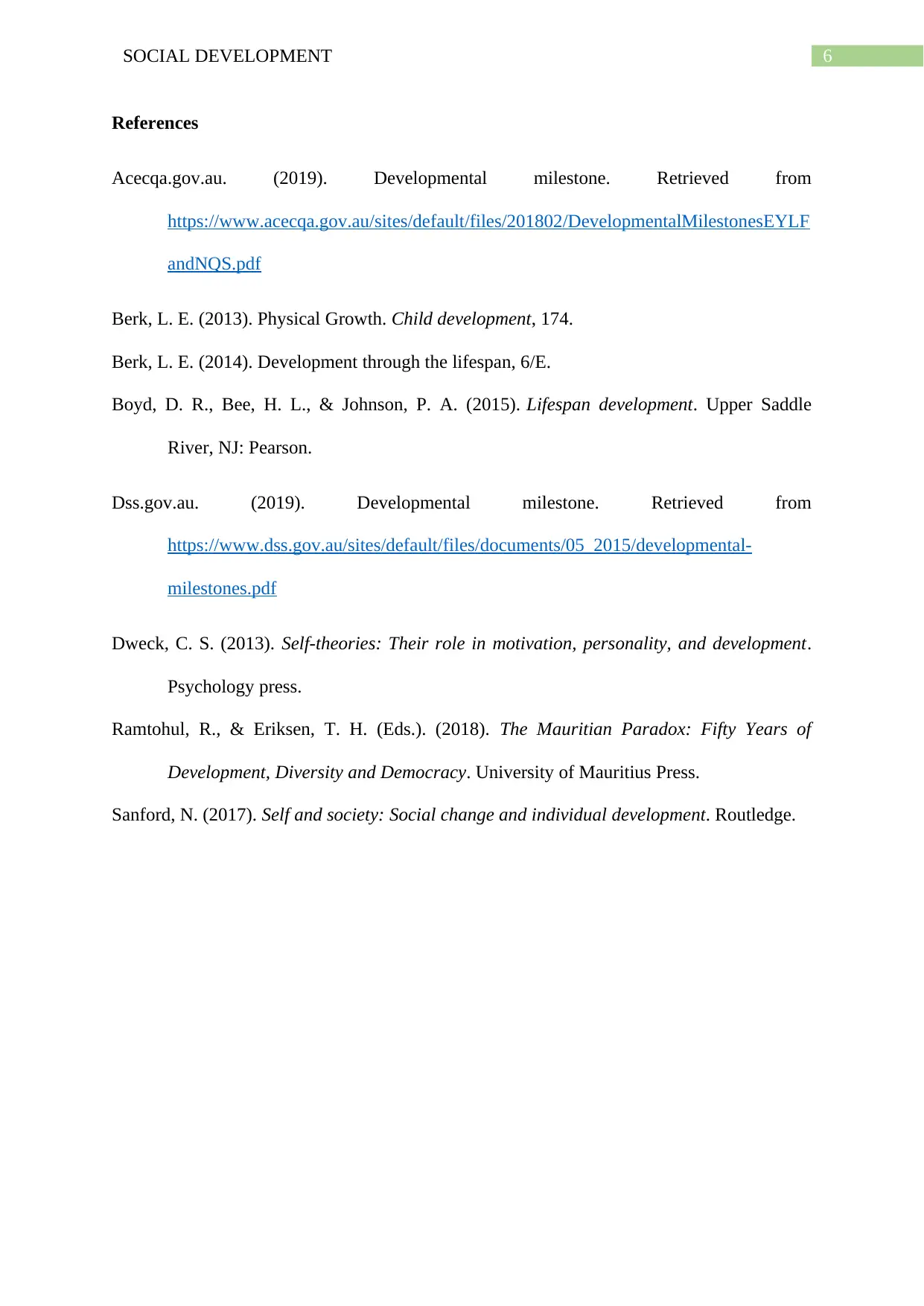
6SOCIAL DEVELOPMENT
References
Acecqa.gov.au. (2019). Developmental milestone. Retrieved from
https://www.acecqa.gov.au/sites/default/files/201802/DevelopmentalMilestonesEYLF
andNQS.pdf
Berk, L. E. (2013). Physical Growth. Child development, 174.
Berk, L. E. (2014). Development through the lifespan, 6/E.
Boyd, D. R., Bee, H. L., & Johnson, P. A. (2015). Lifespan development. Upper Saddle
River, NJ: Pearson.
Dss.gov.au. (2019). Developmental milestone. Retrieved from
https://www.dss.gov.au/sites/default/files/documents/05_2015/developmental-
milestones.pdf
Dweck, C. S. (2013). Self-theories: Their role in motivation, personality, and development.
Psychology press.
Ramtohul, R., & Eriksen, T. H. (Eds.). (2018). The Mauritian Paradox: Fifty Years of
Development, Diversity and Democracy. University of Mauritius Press.
Sanford, N. (2017). Self and society: Social change and individual development. Routledge.
References
Acecqa.gov.au. (2019). Developmental milestone. Retrieved from
https://www.acecqa.gov.au/sites/default/files/201802/DevelopmentalMilestonesEYLF
andNQS.pdf
Berk, L. E. (2013). Physical Growth. Child development, 174.
Berk, L. E. (2014). Development through the lifespan, 6/E.
Boyd, D. R., Bee, H. L., & Johnson, P. A. (2015). Lifespan development. Upper Saddle
River, NJ: Pearson.
Dss.gov.au. (2019). Developmental milestone. Retrieved from
https://www.dss.gov.au/sites/default/files/documents/05_2015/developmental-
milestones.pdf
Dweck, C. S. (2013). Self-theories: Their role in motivation, personality, and development.
Psychology press.
Ramtohul, R., & Eriksen, T. H. (Eds.). (2018). The Mauritian Paradox: Fifty Years of
Development, Diversity and Democracy. University of Mauritius Press.
Sanford, N. (2017). Self and society: Social change and individual development. Routledge.
1 out of 7
Related Documents
Your All-in-One AI-Powered Toolkit for Academic Success.
+13062052269
info@desklib.com
Available 24*7 on WhatsApp / Email
![[object Object]](/_next/static/media/star-bottom.7253800d.svg)
Unlock your academic potential
© 2024 | Zucol Services PVT LTD | All rights reserved.





